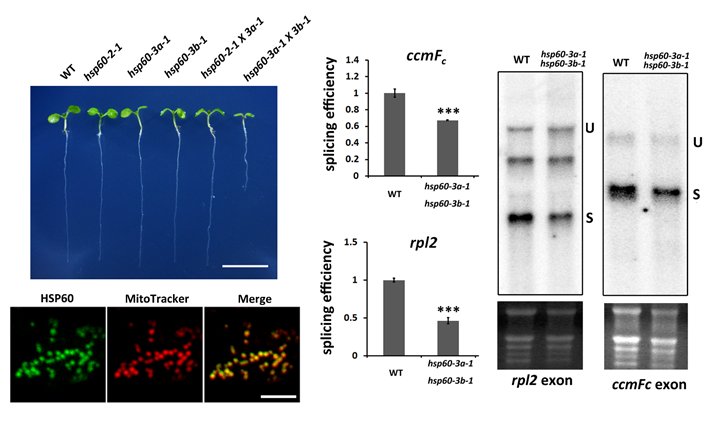[Guang-Yuh Jauh] Mitochondrial Heat Shock Protein 60s Interact with What’s This Factor 9 to Regulate RNA Splicing of ccmFC and rpl2
POST:Mitochondrial intron splicing is a plant-specific feature that was acquired during the coevolution of eukaryotic host cells and a-proteobacteria. The elimination of these introns is facilitated by mitochondrial-targeted proteins encoded by its host, nucleus. What’s this factor 9 (WTF9), a nucleus-encoded plant organelle RNA recognition (PORR) protein, is involved in the splicing of the mitochondrial group II introns rpl2 and ccmFC. Disruption of WTF9 causes developmental defects associated with the loss of cytochromes c and c1 in Arabidopsis. Using a co-immunoprecipitation assay, Hsu et al. from Dr. Guang-Yuh Jauh’s laboratory found that HSP60s interacted with WTF9, which was further confirmed by a pull-down assay. HSP60s are molecular chaperones that assist with protein folding in both eukaryotic and prokaryotic cells. However, accumulating evidence suggests that HSP60s also participate in other biological functions such as RNA metabolism and RNA protection. In this study, we found that consistently with their interaction with WTF9, HSP60s interacted with 48 nucleotides of the ccmFC intron. In mutant studies, the double mutant hsp60-3a1hsp60-3b1 exhibited a small stature phenotype and reduced splicing efficiency for rpl2 and ccmFC. These observations were similar to those in wtf9 mutants and suggest that HSP60s are involved in the RNA splicing of rpl2 and ccmFC introns in mitochondria. Our findings suggest that HSP60s participate in mitochondrial RNA splicing through their RNA-binding ability. (Hsu et al. Plant and Cell Physiology 2018 )
